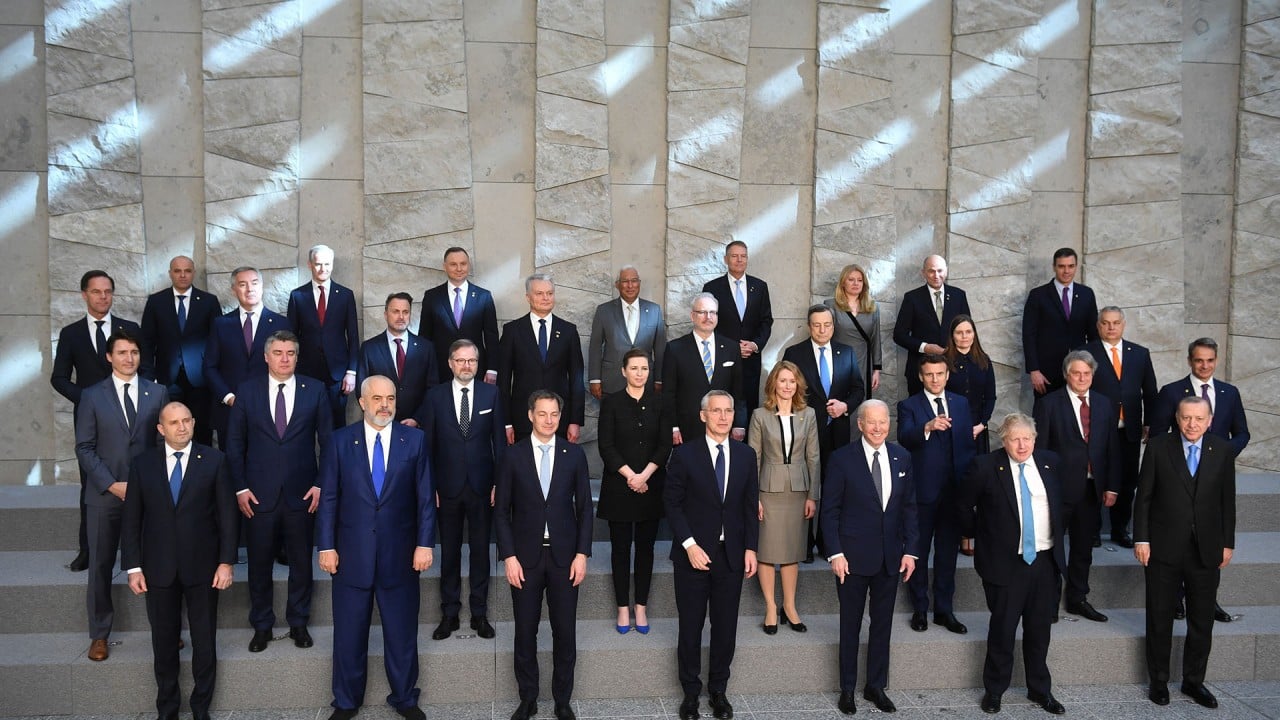
03:51
‘We will not stand by’: Nato heads of state meet to address Russia’s invasion of Ukraine

The major spring and autumn meetings of the International Monetary Fund and World Bank often take place against a background of economic and/or financial crises in one part of the world or another. But this year has seen the “globalisation” of such crises and the world is still only at the start of this unfolding drama.
Apart from the war in Ukraine and its economic fallout, we have a broader-based inflation crisis, an impending global debt crisis, a looming fiscal crisis, supply chain shocks, a looming capital flows crisis, sanctions wars and a global economic slowdown – as well as pandemic and climate change threats.
In more than 40 years of attending and chronicling international gatherings convened by the IMF and World Bank, I have never witnessed such a catalogue of economic and financial distress, nor seen so many economists making gloomy predictions.
The litany of woes is as depressing as it is long. As recently appointed IMF chief economist Pierre-Olivier Gourinchas observed at the spring meetings, as well as the twin crises of pandemic and war, there is a growing “risk of a more permanent fragmentation of the world economy” into geopolitical and economic blocs.
“Such a tectonic shift” would jeopardise the human and economic gains made over the past several generations and, he said, “represent a major challenge to the rules‑based framework that has governed international and economic relations for the last 75 years”.
Despite the links in causality between some of the multiple crises, the tendency to view them as one-off events, to blame others and to ignore underlying causes continues. Russia instigated the Ukraine war but the blame for inflation cannot be laid at Russia’s door as many are doing.
Gourinchas said that: “Even prior to the war [inflation] surged on the back of soaring commodity prices and supply‑demand imbalances. Many central banks, such as the Federal Reserve, had already moved toward tightening monetary policy.
“War‑related disruptions amplify those pressures. We now project inflation will remain elevated for much longer. In the United States and some European countries, it has reached its highest level in more than 40 years, in the context of tight labour markets.”
Inflation, he noted, is a “clear and present danger”, or as IMF monetary and capital markets department director Tobias Adrian suggested, it is “the single most important challenge of our time”. Inflation did not come out of nowhere, it is a legacy of past mistakes and policy excesses.
Central banks, Tobias suggested, should raise interest rates “aggressively in order to bring inflation back to target”. Yet that will sow the seeds of further crises as monetary tightening provokes calls for renewed fiscal stimulus- just when rising interest rates are forcing up government borrowing costs.
IMF fiscal affairs department director Victor Gaspar makes the very good point that “as monetary policy pivots to fight inflation, fiscal policy must pivot to maintain debt sustainability. In other words, budget constraints are back – and they are binding!”
This brings us to the (fast-growing) risk of a global debt crisis and not just in the public sector. As IMF economists noted in a blog: “Global private debt surged by 13 per cent of the world’s gross domestic product in 2020 – faster than the rise seen during the global financial crisis and almost as fast as public debt.”
Global debt levels were already elevated before Covid-19. But in the first year of the pandemic, total debt (including private debt) increased by 28 percentage points to 256 per cent of global GDP – the largest one-year increase on record. More than half of this surge occurred on public balance sheets.
Here again, the links from one economic or financial crisis to another are clear, or should be. Debt has surged on the back of universally low interest rates, which in turn plunged on the back of unprecedented monetary easing designed to counter the impact of the 2008 global financial crisis.
That crisis itself was triggered by financial excess during the subprime mortgage crisis – and so it goes on, and will continue to do so. As Adrian observes: “Interest rates might have to rise beyond what is currently priced in markets to get inflation back to target in a timely manner.”
Central banks “must bring inflation back to target, mindful that excessive tightening of global financial conditions hurts economic growth”, he said. Yet “any sudden reassessment and repricing of risk [...] may expose some of the vulnerabilities built up during the pandemic (surge in house prices and stretched valuations), leading to a sharp decline in asset prices”.
The Ukraine war adds to supply shocks that have struck the global economy in recent years. “Like seismic waves,” says the IMF, “its effect will propagate far and wide through commodity markets, trade and financial linkages.”
It could be the crisis to end all crises unless we stop creating new ones by papering over cracks in the system.
Anthony Rowley is a veteran journalist specialising in Asian economic and financial affairs